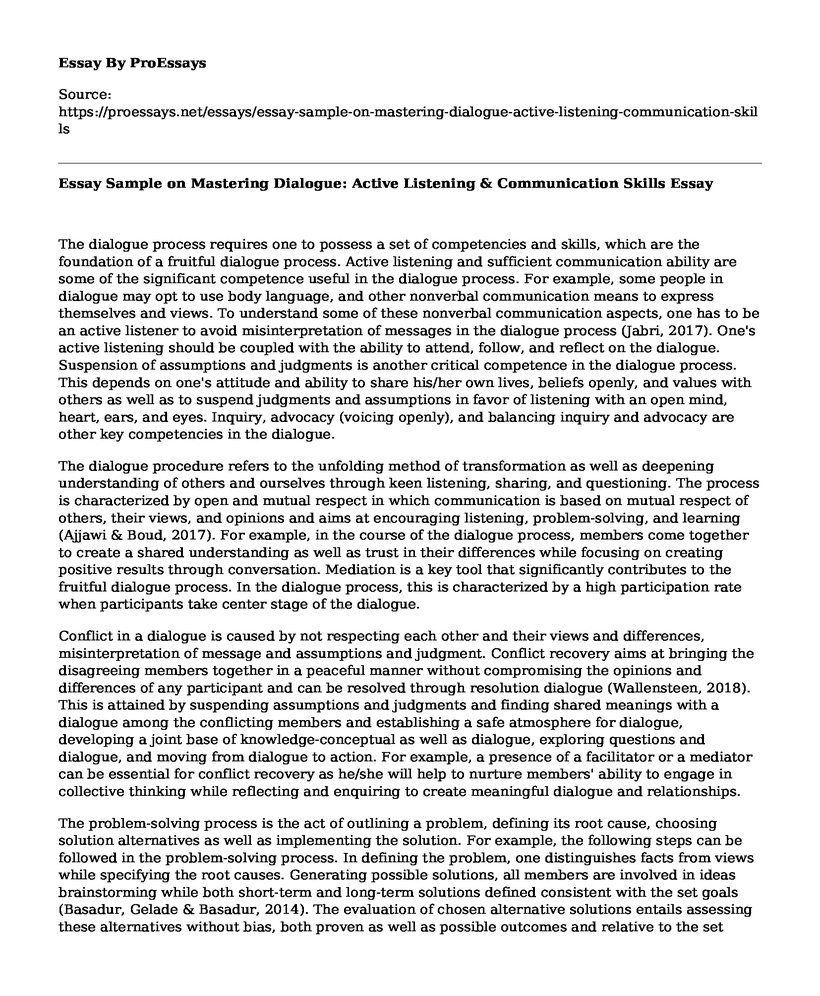The dialogue process requires one to possess a set of competencies and skills, which are the foundation of a fruitful dialogue process. Active listening and sufficient communication ability are some of the significant competence useful in the dialogue process. For example, some people in dialogue may opt to use body language, and other nonverbal communication means to express themselves and views. To understand some of these nonverbal communication aspects, one has to be an active listener to avoid misinterpretation of messages in the dialogue process (Jabri, 2017). One's active listening should be coupled with the ability to attend, follow, and reflect on the dialogue. Suspension of assumptions and judgments is another critical competence in the dialogue process. This depends on one's attitude and ability to share his/her own lives, beliefs openly, and values with others as well as to suspend judgments and assumptions in favor of listening with an open mind, heart, ears, and eyes. Inquiry, advocacy (voicing openly), and balancing inquiry and advocacy are other key competencies in the dialogue.
The dialogue procedure refers to the unfolding method of transformation as well as deepening understanding of others and ourselves through keen listening, sharing, and questioning. The process is characterized by open and mutual respect in which communication is based on mutual respect of others, their views, and opinions and aims at encouraging listening, problem-solving, and learning (Ajjawi & Boud, 2017). For example, in the course of the dialogue process, members come together to create a shared understanding as well as trust in their differences while focusing on creating positive results through conversation. Mediation is a key tool that significantly contributes to the fruitful dialogue process. In the dialogue process, this is characterized by a high participation rate when participants take center stage of the dialogue.
Conflict in a dialogue is caused by not respecting each other and their views and differences, misinterpretation of message and assumptions and judgment. Conflict recovery aims at bringing the disagreeing members together in a peaceful manner without compromising the opinions and differences of any participant and can be resolved through resolution dialogue (Wallensteen, 2018). This is attained by suspending assumptions and judgments and finding shared meanings with a dialogue among the conflicting members and establishing a safe atmosphere for dialogue, developing a joint base of knowledge-conceptual as well as dialogue, exploring questions and dialogue, and moving from dialogue to action. For example, a presence of a facilitator or a mediator can be essential for conflict recovery as he/she will help to nurture members' ability to engage in collective thinking while reflecting and enquiring to create meaningful dialogue and relationships.
The problem-solving process is the act of outlining a problem, defining its root cause, choosing solution alternatives as well as implementing the solution. For example, the following steps can be followed in the problem-solving process. In defining the problem, one distinguishes facts from views while specifying the root causes. Generating possible solutions, all members are involved in ideas brainstorming while both short-term and long-term solutions defined consistent with the set goals (Basadur, Gelade & Basadur, 2014). The evaluation of chosen alternative solutions entails assessing these alternatives without bias, both proven as well as possible outcomes and relative to the set goals and target standards. The last step is implementation and follow-up on the solution whereby feedback from affected members is gathered and ongoing measures and monitoring established as well as evaluation of long-term results based on the final solution.
References
Ajjawi, R., & Boud, D. (2017). Researching feedback dialogue: An interactional analysis approach. Assessment & Evaluation in Higher Education, 42(2), 252-265. https://doi.org/10.1080/02602938.2015.1102863
Basadur, M., Gelade, G., & Basadur, T. (2014). Creative problem-solving process styles, cognitive work demands, and organizational adaptability. The Journal of Applied Behavioral Science, 50(1), 80-115. https://doi.org/10.1177/0021886313508433
Jabri, M. (2017). Managing organizational change: Process, social construction and dialogue. Palgrave.
Wallensteen, P. (2018). Understanding conflict resolution. SAGE Publications Limited.
Cite this page
Essay Sample on Mastering Dialogue: Active Listening & Communication Skills. (2023, Mar 27). Retrieved from https://proessays.net/essays/essay-sample-on-mastering-dialogue-active-listening-communication-skills
If you are the original author of this essay and no longer wish to have it published on the ProEssays website, please click below to request its removal:
- Division of Work in Households Essay Example
- Gender Norms in Social Activities - Essay Sample
- Evolution of Media From 1940-1965 Paper Example
- Social Networking: Connecting the World, but at What Cost? - Essay Sample
- Post-Divorce Parenting: Building Healthy Relationships & Stability - Essay Sample
- 3 Essentials from My Cabinet: Flashlight, Scissors, & Calculator - Essay Sample
- Community Regulating: A New Way to Improve Safety & Quality of Life - Report Example







